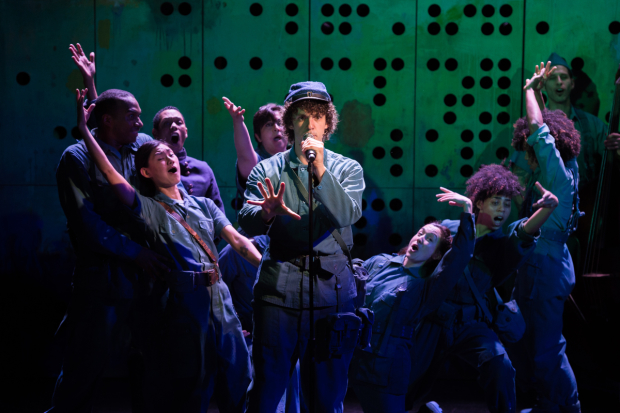Futurity
The Lisps pen a new musical about the development of artificial intelligence during the Civil War.

(© Ben Arons)
César Alvarez and the Lisps like to keep things casual: The opening moments of their new musical, Futurity (now playing at the Connelly Theater under the joint production of Ars Nova and Soho Rep.), features the band onstage introducing themselves and bantering with the audience. It feels very much like the beginning of a rock concert in an intimate venue. This endearing informality is one of the great charms of Futurity. It's also an obstacle as the show raises increasingly large thematic questions, but never really commits to addressing them.
The story follows the correspondence between Ada Lovelace (Sammy Tunis, playing the real-life poet/mathematician daughter of Lord Byron) and Julian Munro (Alvarez, playing a completely fictional conscript in the Union Army) during the American Civil War. Julian would like to design a machine that can think creatively, with the ultimate goal of ending all wars. He believes that war is the "failure of imagination" born out of our "base animal instinct," but a mathematical machine would have no such instinct. He calls this machine the "steam brain." Ada is skeptical such a thing can ever be invented in their lifetimes, but she is drawn to its poetic impracticality. They begin to work on making it happen in London as Julian's regiment marches from Ohio to Virginia…and all before the advent of transatlantic flight!
Alvarez doesn't concern himself with such banal physical practicality and never really claims to: "Do not attempt to learn about history from this musical," he and Tunis warn at the top of the show. Instead, the script is a heady mélange of existential questions and quixotic dreams: "What's the animating force from which intelligence emerges / Is it material in nature or a spiritual convergence?," Ada sings in what is perhaps the most philosophically dense "I want" song in the history of musical theater.
Ideas surge a mile a minute through Alvarez's pensive and probing lyrics: From whence does intelligence derive? Why do we have war? Would a machine beholden only to mathematics be instinctively pacifist? These deep thoughts are set to the Lisps' distinctive folk-rock sound, which is habitually melodic, often dreamy, and always beautiful. This score is the most caffeinated lullaby you'll ever hear.
Alvarez regularly breaks out of the story to comment on how the show is going. "I can neither confirm nor deny that I fell down a flight of stairs," he said in an exaggerated vocal fry (the sign he's playing César and not Julian) following a mysterious crash backstage. With its presentation of very important themes through an unashamed theatricality, Futurity often feels like a lost play by Bertolt Brecht (which is unsurprising considering the Lisps' acclaimed adaptation of that playwright's Good Person of Szechwan). Unfortunately, Alvarez never fully commits to the direction of the piece, blunting the impact of this epic theater.
Under the steady direction of Sarah Benson the show never stops in its tracks, nor does it steam forward toward its deadly logical conclusion. Rather, it ambles, stopping to smell the flowers along the way. The sauntering number "Cumberland Gap" (used when the army is on the march) reinforces this feeling. Electric individual performances emerge (percussionist Eric Farber drums with his whole body and it is transfixing), but too often the staging is characterized by a general languor. Even though the entire cast is outfitted in military uniforms (made slightly less uniform by Emily Orling's clever little alterations), they have the feeling of an army that just woke up from a nap. The somewhat detached Karen Kandel plays the General, although she feels much more like a historian in a Ken Burns documentary than an actual Civil War general. If I were Abraham Lincoln, I'd be scared.
Still, the cast is undeniably talented: Everyone plays an instrument, which they carry in lieu of rifles. Tunis and Alvarez rock out on the show's up-tempo numbers and Yi Zhao lights this stage for a Brechtian rock concert: glitz tempered by foreboding shadows. Also, the big reveal of the steam brain (constructed with unbridled imagination by Eric Farber) is positively gasp-worthy. It looks like something straight out of Willy Wonka's chocolate factory.
Those who like their theater messy and beautiful are liable to fall in love with Futurity. The show's spritely touch-and-go relationship with its themes, however, will leave many feeling unsatisfied. If an artist is going to bite into a piece of red meat, he ought to be prepared to chew. Futurity has a habit of spitting its themes into a napkin and hiding them under the table.









